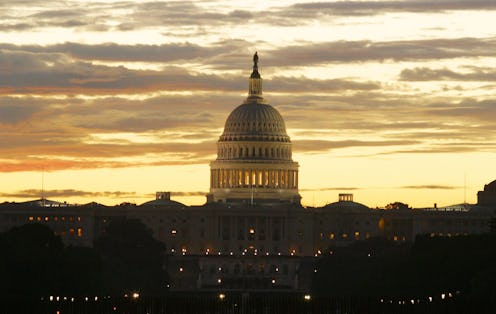News
A Record Number Of People Voted In D.C.'s Primary
As the polls closed on the nation's last primary and results came in showing that Hillary Clinton won the Washington, D.C., primary by a landslide, it's helpful for D.C. residents and non-residents alike to know how many people voted in the D.C. primary, to put Clinton's win in a larger context.
While the totals remain unofficial for a few days as the D.C. Board of Elections finalizes the votes (an intense and time-consuming process I had participated in last year in my home state of North Carolina, which was a much smaller election), the numbers as of Tuesday night are promising: 94,845 people voted for their Democratic presidential preference, a number that represents 20.5 percent of the city's 461,575 registered voters, according to Pew Research data.
Voter turnout in D.C. represents a marked increase over the average Democratic primary turnout in this year's primaries: Pew reported that the average turnout was 14.4 percent, making the D.C. Democratic primary one of the highest for voter turnout in the country. While this percentage doesn't compete with 2008's 19.5 percent average, it was the second-highest turnout percentage since the presidential primaries of 1988 (which had a 25.2 percent turnout).
Given that Clinton declared herself the presumptive nominee the night before the June 7 "Super Tuesday" primaries, her overwhelming victory in the D.C. primary is unsurprising, given she won 78.7 percent of the total votes and 16 of the available pledged delegates.
Despite record turnouts for this year's presidential primaries, some pundits argue that primary turnout isn't an indicator of turnout in the general election. Prior to Donald Trump's win in the May 3 Indiana primary, some pundits claimed that the high turnout at Republican primaries and caucuses could foreshadow a Republican White House win in November.
However, David Brooks, a conservative New York Times writer, argued on CBS's Meet The Press that this would be unlikely because many elections saw incumbent presidents as the party nominees, which made voting in nominating elections unnecessary. Politifact cited Democratic primary turnout in 1988, which was nearly double that of the Republicans', as an illustrative point: Bush won that election by roughly 7 million more votes than his opponent, Michael Dukakis. It's worth noting that since Trump became the Republican party's presumptive nominee, voter turnout in Republican contests has declined from an average 16.6 percent to 8.4 percent.
It remains to be seen whether the trends of primary voter turnout this nomination season will extend to the general. My somewhat-experienced, but ultimately speculative prediction: As each party's presumptive nominees ramp up both the cult of personality surrounding them and the digs at each other, voter turnout will be high, as people vote not for the candidates' parties or platforms, but for the candidates themselves.
